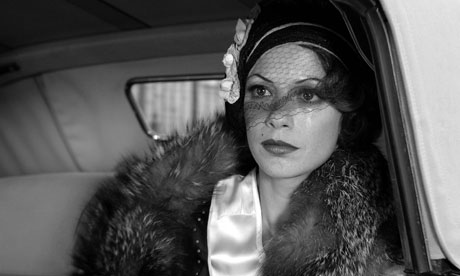
At a time when eye-straining, ear-bashing, hi-tech 3D movies are being drearily touted as the inevitable "future of cinema", Michel Hazanavicius's The Artist (2011, Entertainment, PG) reminds us that great movies – and great movie-making techniques – are timeless. An affectionate homage to the early days of cinema, this wonderful near-silent black-and-white beauty about a matinee idol threatened by the arrival of sound tips its cine-literate hat towards everything from the swashbuckling romps of Douglas Fairbanks to the pathos of Chaplin and the slapstick of Keaton. Narratively, the film intelligently acknowledges the die-hard templates of Singin' in the Rain and A Star is Born, while an hallucinogenic dream sequence in which our hero is haunted by the spectre of sound would not look out of place in a David Lynch movie. Hazanavicius's best picture Oscar-winner is no mere genre pastiche, but encourages us to laugh with – rather than at – the tropes of early cinema, perfectly fitting its story within the confines of its elegant 4x3 frame. Bravo!
Tempted as I am to delve deeply into the cultural references that run helter skelter through writer-director Sean Durkin's debut feature, the less you know about Martha Marcy May Marlene (2011, Fox, 15) before watching it the better. Suffice to say that the film deals beautifully with complex issues of personal identity, family ties and communal guilt via an engrossing tale of a lost soul haunted by the ghosts of her runaway past.
Rising star Elizabeth Olsen is pitch perfect as the antiheroine attempting to rebuild a "normal" life with her middle-class sister and brother-in-law after bailing out of a neo-hippie cult. A strange, lucid dream of a movie, this drifts so gently between the ambling and the alarming that the viewer barely notices the ground shifting beneath them as awful truths are revealed. The overall effect is quietly overpowering, making this one of the most understatedly remarkable films of the year.
There's plenty of authentically low-key pleasure to be had, too, from Drake Doremus's similarly Sundance-friendly hit Like Crazy (2011, Paramount, 12), an impressively up-close-and-personal account of young love between a British and American student, kept apart by the red tape of US/UK immigration and visa laws. Felicity Jones and Anton Yelchin are utterly believable as the star-crossed pair, soulmates whose initially adolescent passion is sorely tested by their subsequent geographical separation.
Will their love outlast the bureaucracy that comes between them? Or will they discover that what happens in college stays in college. Shot in unobtrusive, hand-held style with ample room for improvisation by the cast, this offers an honest and tender portrait of the differing phases of a relationship, and manages to marry delightfully naive charm with real adult understanding.
In Pablo Trapero's bold Argentinian neo-noir Carancho (2010, Axiom, 15), an ambulance-chasing lawyer and a troubled hospital doctor discover an unlikely personal bond that causes both to question their way of life. Like Alejandro González Iñárritu's Mexican thriller Amores Perros, which brought together its lead characters in a spectacular road-traffic accident, so the lives of everyone in Trapero's parable-like pile-up play out against a car-crash background of unfolding catastrophe – social, political and personal.
As the titular "vulture", Ricardo Darín has the appearance of a tortured wretch whose work in Argentina's unofficial "social service" industry – encouraging poor people to fall in front of cars for money – has taken its toll on what's left of his soul. Only Martina Gusmán's Luján offers hope of salvation, although she has her own demons to wrestle as she works through another hellish night in A&E. Juggling raw metaphysics and stark social commentary, Trapero conjures a jet-black portrait of life on the edge (of the law, of morality) distinguished by a profoundly humanist streak that makes the plight of its characters all the more affecting.
With the clumsily entitled Marvel Avengers Assemble dominating the UK cinema box office, the arrival on DVD of Josh Trank's ambitious Chronicle (2012, Fox, 15) offers a rather different take on the perils of attaining "special" powers.
After venturing into a mysterious hole in the ground wherein lurks an inexplicably glowing object, three high-school friends develop telekinetic abilities that transform their fortunes. Yet as comic books constantly warn: "With great power comes great responsibility" – greater than anything that could reasonably be expected of the average anguished teenager consumed with the uncontrollable rage of youth.
Filmed in faux "found-footage" style (a motif that wears somewhat thin), Trank's anti-superhero yarn scores points for daring to ask how schoolkids would really cope with such abilities. Imagine a cross between Brick and The Invisible Maniac with the background noise of Gus van Sant's Elephant and you're in the right ballpark.
In cinemas, Journey 2: The Mysterious Island (2012, Warner, PG) was a poisonously perfunctory sequel to Journey to the Center of the Earth, the main selling point of which seemed to be that it was in 3D and featured Dwayne "The Rock" Johnson playing a ukulele. Now on DVD, where 2D stills rules the roost, we are left simply with Dwayne's musical endeavours to spice up an otherwise utterly unmemorable debasement of Jules Verne's legacy. Michael Caine grins like a man who just got an enormous pay cheque for being avuncular and pretending to sit on the back of a giant bumble bee. As he once said of Jaws: The Revenge: "I haven't seen it, but I've seen the house that it built."

